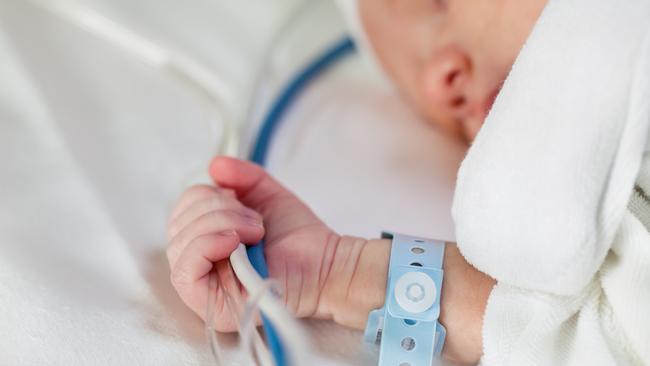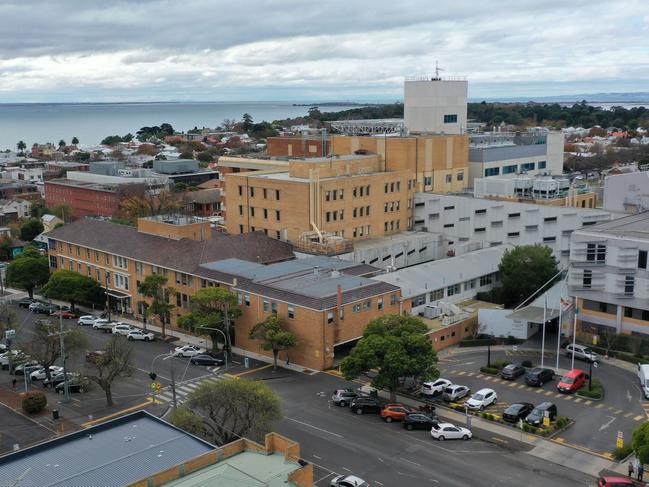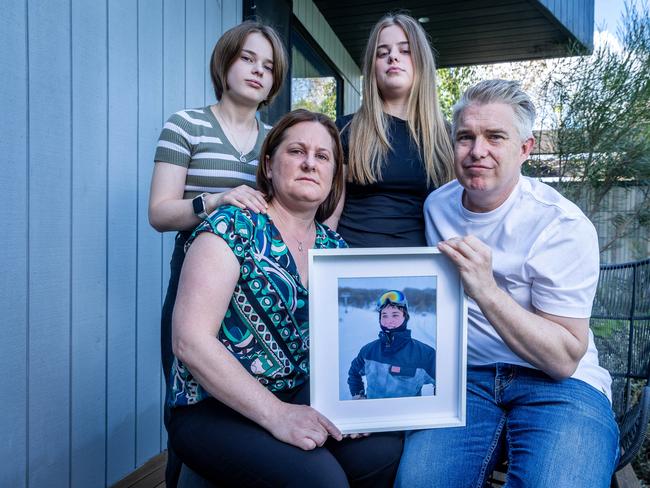A newborn baby’s death at University Hospital Geelong was not properly reported nor investigated. Coroners have questions
Newborn baby Tasman died one week after he was born. Now, a Coroner has found his death wasn’t properly investigated nor reported.

Victoria
Don't miss out on the headlines from Victoria. Followed categories will be added to My News.
The hospital death of another Victorian child — a newborn baby – that was never reported to health authorities has been revealed.
Baby Tasman suffered a “traumatic head injury” during birth and died seven-days later in a tragic case that should have been reported and investigated further, a Coroner has heard.
Coronial documents show, while no adverse findings were made about Tasman’s medical care, serious questions have now emerged about the University Hospital Geelong actions in the aftermath of his death.
It comes amid ongoing concern about Victoria’s ability to monitor and investigate patient deaths when hospitals fail to report them to Safer Care Victoria.

The Herald Sun revealed on Monday that SCV has been left in the dark about several child deaths because the treating hospitals, in a decision at odds with other experts, ruled there were no issues to justify a sentinel event report.
Coroner Simon McGregor found baby Tasman – who was born via emergency caesarean – died in 2022 from complications of traumatic head injuries which were the “unintended consequences of reasonable medical procedures” by “appropriately experienced staff”.
But the coronial findings, handed down last week, also reveal the court’s independent medical panel believe his death “fulfilled” the criteria for a “sentinel event”, which are supposed to be reported within three days to SCV.
But Barwon Health, who held an internal review into Tasman’s care, “confirmed they did not report his death to the Consultative Council on Obstetric and Paediatric Mortality and Morbidity, nor to SCV as a sentinel event”.
The hospital’s internal review was also examined by an independent expert who told the Coroner, while three of the recommendations were appropriate, one “could be strengthened”.
The Coroner heard Tasman’s mother was 36 weeks pregnant when her waters broke on August 10.
On August 12, after his delivery stalled for several hours during active labour and an instrumental-assisted birth did not work, doctors began an emergency caesarean.
But the baby’s head was too low – an emergency known as foetal head impaction – so a second doctor had to manually push the baby’s head as the other obstetrician removed him from the womb.
He was born “in poor condition” with “no detectable heart rate” but – after about twenty minutes of CPR – resuscitated and placed on a ventilator.

He was transferred with critical head injuries to a NICU in Melbourne, but he continued to deteriorate and had seizures.
Scans revealed he had “an extensive brain injury consistent with” an injury from a lack of oxygen to the brain and he died at one-week of age.
A post-mortem exam found Tasman had external and internal head injuries and haemorrhages, but “it was not possible to comment on the timing of the various brain injuries”.
The forensic pathologist ruled he died from complications of birth-related traumatic head injury.
Obstetrician and maternal foetal medicine specialist Associate Professor Ryan Hodges, asked to review Tasman’s care, found “all necessary and suitably experienced medical staff were present”, and “appropriate steps were taken” to manage an impacted foetal head.
“He could not be certain which factors contributed in what proportions to the outcome, such that a contribution of all factors could not be excluded,” Coroner McGregor said.
Barwon Health internal review made four recommendations, including improving documentation and training, and ensuring guidelines clearly identify “what constitutes prolonged second stage of labour” and the importance of “timely recognition … to reduce risk adverse outcomes”.
Prof Hodges said the direction to include more training on caesarean emergencies “could be strengthened” and “it is challenging to ensure annual multidisciplinary maternity emergency training … for all birth suite maternity staff”.
The Coroner heard obstetric medical and midwifery clinicians “may be called upon unexpectedly” to help manage a disimpacted head.
“Often this is more likely to be a more junior clinician who is actively not scrubbed into the caesarean,” he said.
The Coroner recommended Barwon Health review their policies and procedures for reporting Sentinel events to ensure they follow Safer Care Victoria’s guidelines.
Barwon Health chief medical officer Dr Ajai Verma said the hospital “expresses sincere apologies to the family for their heartbreaking loss”.
“An in-depth review was carried out following the event with input from external experts,” he said. review was .
“Processes for reporting patient safety events, including requirements for reporting sentinel events aligned with Safer Care Victoria’s reporting standards at the time of the event.”
A Safer Care Victoria spokeswoman said “any loss of a child is a tragedy, and our thoughts are with Tasman’s family”.
Call for thorough and independent inquiry
The government is “seeking advice” on hospital’s reporting of patient deaths after conceding it needs to do more to improve transparency.
The Herald Sun revealed on Monday that Safer Care Victoria was left in the dark about several child deaths because the treating hospitals, in a decision at odds with other experts, ruled there were no issues to justify a sentinel event report.
Jacinta Allan announced the informal review hours after it was revealed that doctors were pleading for change and another potentially avoidable death, a newborn named Amir, had gone unreported for years.
The Premier said Health Minister Mary-Anne Thomas had requested Safer Care Victoria (SCV) and the Consultative Council on Obstetric and Paediatric Mortality and Morbidity provide advice on how the government could strengthen hospital reporting frameworks to ensure cases were properly investigated.
The government said the work was already under way but did not say why they did not mention it when repeatedly asked about the issue before Monday.
Grieving parents warned reforms introduced after a cluster of baby deaths at Bacchus Marsh Hospital would still fail to stop the same tragedy if it happened today.
SCV was created in 2016 amid changes to improve transparency and the department’s oversight of hospital safety.
But when Tamara and Ben McKenzie’s son Max died in 2021 after an allergic reaction, Box Hill Hospital repeatedly dismissed their concerns, forcing them to report his death to SCV.
Dr McKenzie, an emergency physician, said Max should be alive, but the hospital waited too long to intubate him.
“Max’s death would never have been reported if I hadn’t been a doctor and been there,” Dr McKenzie said.
“There’s nothing to stop another Bacchus Marsh happening,” he said.
Ms McKenzie said: “The government needs to recognise that SCV is not doing everything it needs to do.”
Eastern Health has previously said they were co-operating with the coronial process, but declined to comment further on Max’s case.
The McKenzies support the local AMA’s push to require Victorian hospitals to report all unexpected and healthcare-associated child deaths to SCV.
The latest data, from the 2023 financial year, shows almost 80 per cent of sentinel events were not reported to SCV within the required three business days, though the real numbers may be higher.
Opposition health spokeswoman Georgie Crozier said there needed to be a “thorough and independent inquiry”.
“We have had too many stories of babies tragically dying and Safer Care Victoria not undertaking the investigative work that they need to,” she said.
Ms Allan hinted at supporting the AMA’s proposal, but said she would await fresh advice. “This does seem to be at the heart of one of the issues,” she said. “I’ll make it very clear … If there is more that we need to do, we will do it.
A Safer Care Victoria spokeswoman said they have “given a commitment to the AMA to look at how we can strengthen our reporting processes and available resources for health services”.



